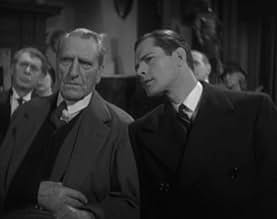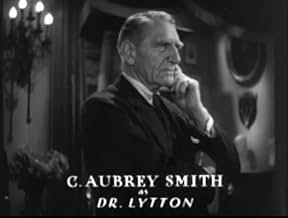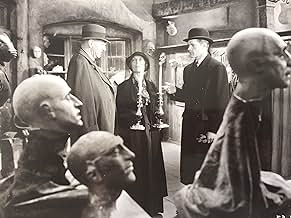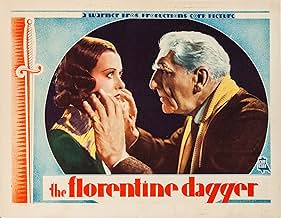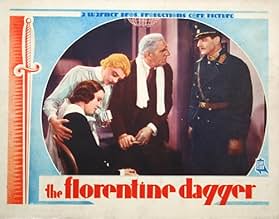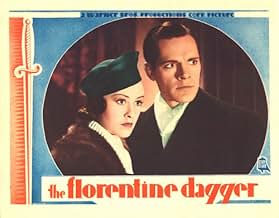Juan Cesare, a descendant of the Borgias of Vienna, thinks he may have a murder streak in him acquired from his long-dead relatives, is is love with Florence Ballau, but her father lodges a ... Read allJuan Cesare, a descendant of the Borgias of Vienna, thinks he may have a murder streak in him acquired from his long-dead relatives, is is love with Florence Ballau, but her father lodges a strong protest. Victor Ballau is later found dead with a Florentine dagger of the Borgia t... Read allJuan Cesare, a descendant of the Borgias of Vienna, thinks he may have a murder streak in him acquired from his long-dead relatives, is is love with Florence Ballau, but her father lodges a strong protest. Victor Ballau is later found dead with a Florentine dagger of the Borgia type stuck firmly in him. Juan is all wrought up and tortured by thoughts he may have been ... Read all
- Director
- Writers
- Stars
- Bartender
- (scenes deleted)
- Newspaper Editor
- (scenes deleted)
- Eric - Night Watchman
- (uncredited)
- Detective
- (uncredited)
- Director
- Writers
- All cast & crew
- Production, box office & more at IMDbPro
Featured reviews
Old World setting for okay murder mystery
Woods, a descendant of the infamous Borgia family, intends to kill himself in the ancestral village. Luckily, however, psychiatrist Smith convinces him to try writing a play to rid himself of his demons. Next thing we know, Woods is in Vienna where he's written a play about the Borgias and producer O'Neill is preparing it for the stage. When O'Neill's daughter Margaret Lindsay shows up, Woods knows immediately that she is perfect for the role of Lucretia.
It's a unique setup that gradually develops into a more standard mystery plot: Woods falls in love with beautiful Lindsay, her father forbids their marriage and soon afterwards is found murdered. The murder weapon? An ancient dagger supposed to be an actual Borgia relic. The suspects? Those closest to the murdered man. Woods investigates as best he can, his old pal Aubrey Smith takes on the psychological angle, and Lindsay seems like she might be shielding someone - but whom?
Robert Barrat has a good role as a humorous police inspector (who keeps calling his wife to tell her whether he'll be home late). Woods and Lindsay are fine as the leads. C. Aubrey Smith does a nice job, as always, as the shrewd older gentleman.
Overall, this B mystery tries to be something a little different and mostly succeeds.
Tidy Mystery with Robert Barrat and Eily Malyon Taking Acting Honors
Woods and Lindsay fall in love, but O'Neill is stabbed to death with one of the three Florentine daggers we had seen displayed earlier. Woods becomes the main suspect because of his erratic behavior and he is, after all, a Borgia. But Lindsay seems a tad off also. And Smith is always lurking. Enter the local inspector (Robert Barrat), a happy fellow who seems totally uninvolved with the murder case and is always receiving phone calls from Julia. Lindsay had left the play in a rush and is jailed on suspicion of murder. But then there is another dagger attackthis time on Smith. That clears Lindsay. Or does it? The police had let her go. Woods and Smith end up at an auction house, following a wigmaker (Eily Malyon) who buys the candle sticks that were found by O'Neill's body. Everyone converges at the wigmaker's shop and the crime is solved. All very tidy and clever. Barrat threatens to steal the film from the more stolid actors, but his character is too unbelievable, especially as he lets the murderer go free! Go figure.
Paul Porcasi is a police man, Henry Kolker is the auctioneer, Florence Fair is the weird maid, Herman Bing (who has no part) is the baker, Louise Seidel is his assistant, and Frank Reicher is the stage manager. Woods is boring, Lindsay is miscast, and Smith is relatively subdued. Only Barrat and Malyon seem to have much life. Judels serves as the castle your host, but Ottiano seems irrelevant to the story. Makes one wonder about the editing here as Ottiano and Bing have no reasons to be in the story. And the play is a STINKER!
Interesting, But Not Sure Where It's Going
Oddball little movie, not quite a whodunit since the suspects are too under-developed to pick through. The result is more like an early noir with Cesare (Woods) struggling against dark forces and maybe fate, too. In fact, I'll bet the lighting bill didn't exceed 5 bucks. Also, I'm with the reviewer pointing out that Woods lacks the expressive depth to play the central character effectively. Too bad, because that would have made the movie more memorable. On the other hand, there's the craggy-faced Aubrey Smith as a commanding head doctor, and a most un- cop-like Robert Barrat as chief cop. And what about actress Eily Malyon whose close-ups are enough to scare off both Karloff and Lugosi.
All in all, I'm not sure the movie knows where it wants to go. The threads do not blend well. Still, there are some creepy moments that manage to compensate. Then too there's that surprise ending where justice happily triumphs over law. Looks like the screenplay (1935) managed to sneak this by a newly installed Production Code (1934). Anyway, my guess is that when Barrat leaves the airport he's headed to the Playboy Club no matter what he's told the wife.
"If there's one thing more useless than a talkative woman it is one that is determined not to talk."
Bland Mystery
** (out of 4)
Yet another murder/mystery with this time a young play-write (Donald Woods) stopping off in a small village where he meets a beautiful young woman (Margaret Lindsay) who he wants in his latest play. Soon the play is a hit and they want to be married but her father (Henry O'Neill) refuses permission but soon he's found dead with a dagger in his heart. That's pretty much the set-up to this thing but in the end I found the majority of the picture to be downright boring with very little going for it. I've always thought Florey did his best work outside this genre as it just seemed like he never could pull things together very well. I think the biggest problem with this film isn't his direction but instead it's the screenplay that doesn't offer up any decent characters and the weak story is just a major drag. I had a very hard time getting into the film early on simply because the characters were all underwritten and even worse is the fact that the movie itself doesn't really know what it wants to do. Yes, we eventually get the mystery but everything is pretty dry without any small laughs and the romance is pretty boring as well. Woods is usually a very reliable actor but even he seems very bored here as he goes from one scene to another without too much energy and seems to be lacking any type of passion. Lindsay is also pretty bland in his role but so is O'Neill as the soon-to-be-dead father and Robert Barrat does very little with the Inspector role. C. Aubrey Smith is good as the doctor who ends up staying close to Woods. Florey does add a couple nice touches including a rich atmosphere in the house as well as a few other scenes where the darkness does some justice but in the end this thing is just too flat for its own good.
Did you know
- TriviaWarner Bros. created the advertising marketing ploy "Clue Club" to increase audiences attending its crime mystery/drama movies. Twelve titles showing the Warner Bros. "Clue Club" promo footage were released from 1935 to 1938.
Clue Club #1: The White Cockatoo (1935)
Clue Club #2: While the Patient Slept (1935)
Clue Club #3: The Florentine Dagger (1935)
Clue Club #4: The Case of the Curious Bride (1935)
Clue Club #5: The Case of the Lucky Legs (1935)
Clue Club #6: The Murder of Dr. Harrigan (1936)
Clue Club #7: Murder by an Aristocrat (1936)
Clue Club #8: The Case of the Velvet Claws (1936)
Clue Club #9: The Case of the Black Cat (1936)
Clue Club #10: The Case of the Stuttering Bishop (1937)
Clue Club #11: The Patient in Room 18 (1938)
Clue Club #12: Mystery House (1938)
Details
- Release date
- Country of origin
- Languages
- Also known as
- Clue Club #3: The Florentine Dagger
- Filming locations
- Production company
- See more company credits at IMDbPro
- Runtime
- 1h 9m(69 min)
- Color
- Sound mix
- Aspect ratio
- 1.37 : 1

